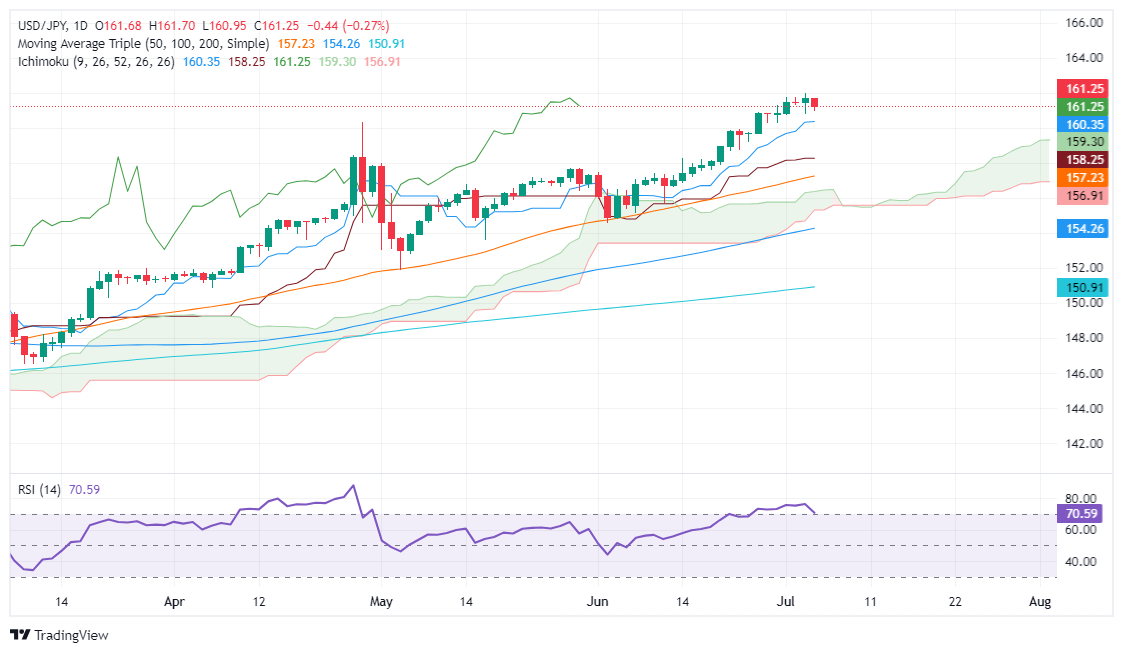- Analiza
- Novosti i instrumenti
- Vesti sa tržišta
- USD/JPY Price Analysis: Consolidates below 161.50 due to thin trading
USD/JPY Price Analysis: Consolidates below 161.50 due to thin trading
- USD/JPY dips to 161.24, down 0.28%, amid quiet trading on US Independence Day.
- RSI leaves overbought zone, suggesting waning buying momentum, yet remains bullish above the 50-neutral line.
- Buyers aim for YTD high of 161.95 and key 162.00 resistance, with sights on November 1986 high of 164.87.
- Support established at 161.00, 160.35 (Tenkan-Sen), 159.30 (Senkou Span A), and 158.25 (Kijun-Sen).
The USD/JPY registers minimal losses in thin volume conditions during the North American session due to US financial markets being closed in observance of the US Independence Day holiday. The major trades at 161.24, down 0.28% after hitting a daily high of 161.70.
USD/JPY Price Analysis: Technical outlook
The USD/JPY edged slightly lower yet failed to push decisively below the 161.00 psychological level, seen as the floor in the near term. Buyers would remain leaning to this level in anticipation of rallying toward the year-to-date (YTD) high of 161.95 before claiming 162.00 ahead of the November 1986 high of 164.87.
Buying momentum begins to fade as the Relative Strength Index (RSI) exits overbought territory, seen as a selling signal. However, unless the RSI pierces the 50-neutral line, remains bullish biased.
If USD/JPY drops below 161.00, the next stop would be the Tenkan-Sen at 160.35. A breach of the latter can exacerbate a pullback toward the Senkou Span A at 159.30, followed by the Kijun-Sen at 158.25.
USD/JPY Price Action – Daily Chart
Japanese Yen FAQs
The Japanese Yen (JPY) is one of the world’s most traded currencies. Its value is broadly determined by the performance of the Japanese economy, but more specifically by the Bank of Japan’s policy, the differential between Japanese and US bond yields, or risk sentiment among traders, among other factors.
One of the Bank of Japan’s mandates is currency control, so its moves are key for the Yen. The BoJ has directly intervened in currency markets sometimes, generally to lower the value of the Yen, although it refrains from doing it often due to political concerns of its main trading partners. The current BoJ ultra-loose monetary policy, based on massive stimulus to the economy, has caused the Yen to depreciate against its main currency peers. This process has exacerbated more recently due to an increasing policy divergence between the Bank of Japan and other main central banks, which have opted to increase interest rates sharply to fight decades-high levels of inflation.
The BoJ’s stance of sticking to ultra-loose monetary policy has led to a widening policy divergence with other central banks, particularly with the US Federal Reserve. This supports a widening of the differential between the 10-year US and Japanese bonds, which favors the US Dollar against the Japanese Yen.
The Japanese Yen is often seen as a safe-haven investment. This means that in times of market stress, investors are more likely to put their money in the Japanese currency due to its supposed reliability and stability. Turbulent times are likely to strengthen the Yen’s value against other currencies seen as more risky to invest in.
© 2000-2026. Sva prava zaštićena.
Sajt je vlasništvo kompanije Teletrade D.J. LLC 2351 LLC 2022 (Euro House, Richmond Hill Road, Kingstown, VC0100, St. Vincent and the Grenadines).
Svi podaci koji se nalaze na sajtu ne predstavljaju osnovu za donošenje investicionih odluka, već su informativnog karaktera.
The company does not serve or provide services to customers who are residents of the US, Canada, Iran, The Democratic People's Republic of Korea, Yemen and FATF blacklisted countries.
Izvršenje trgovinskih operacija sa finansijskim instrumentima upotrebom marginalne trgovine pruža velike mogućnosti i omogućava investitorima ostvarivanje visokih prihoda. Međutim, takav vid trgovine povezan je sa potencijalno visokim nivoom rizika od gubitka sredstava. Проведение торговых операций на финанcовых рынках c маржинальными финанcовыми инcтрументами открывает широкие возможноcти, и позволяет инвеcторам, готовым пойти на риcк, получать выcокую прибыль, но при этом неcет в cебе потенциально выcокий уровень риcка получения убытков. Iz tog razloga je pre započinjanja trgovine potrebno odlučiti o izboru odgovarajuće investicione strategije, uzimajući u obzir raspoložive resurse.
Upotreba informacija: U slučaju potpunog ili delimičnog preuzimanja i daljeg korišćenja materijala koji se nalazi na sajtu, potrebno je navesti link odgovarajuće stranice na sajtu kompanije TeleTrade-a kao izvora informacija. Upotreba materijala na internetu mora biti praćena hiper linkom do web stranice teletrade.org. Automatski uvoz materijala i informacija sa stranice je zabranjen.
Ako imate bilo kakvih pitanja, obratite nam se pr@teletrade.global.
















